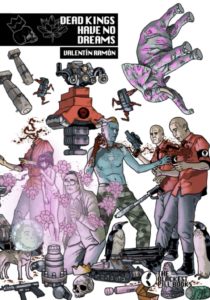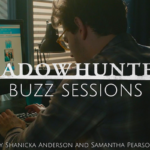
 After reading the first few pages of Dead Kings Have No Dreams, my brain sent a transmission deep into my soul: This is it. A book that you’re not going to shut up about for a long time.
After reading the first few pages of Dead Kings Have No Dreams, my brain sent a transmission deep into my soul: This is it. A book that you’re not going to shut up about for a long time.
Creator Valentín Ramón tells the story of a (certainly near) future society where humans receive a universal basic income and androids do all the work. So what do humans do with all of their free time? Well, drugs, mostly, or they escape into virtual reality–its own kind of drug. Addiction spikes. Crime rates increase. And humans become worse version of themselves as they desperately try to find meaning in a life where they don’t work. We experience this eerily realistic future alongside the protagonist, J, as he attempts to process how his romantic relationship with Wendy fell apart.
And it is masterfully done.
From their first, casual workplace interaction (Wendy: “Do you want me to suck your dick?”) to their last goodbye (Wendy has chosen to replace him with a virtual elephant that has a particular tongue talent), it’s an emotional experience. Some of the scenes made me laugh, others made me gaze longingly at the page–tears threatening. And this is largely due to Ramón’s gift with language and the continual, beautiful drip of existential dread.
Alongside the refrain “The things we do for love,” the story reflects on the Big Question: How does one make peace with one’s existence? It’s uncomfortable how much I identify with J. At one point, he’s disparaging people who build their reality around fictions (academic endeavors is how he copes–*seen*), and, android Wendy (I’m not revealing any details about the android now called Wendy; it’s too good) tells him, “To cover up all those doubts about yourself with lies and fictions is a common practice between bipeds. There are not many people trying to escape those fictions the way you did. I think you are special. Really special.”
But, as Dead Kings Have No Dreams emphasizes, to be special in a world like this results in a solitary life, trapped in that awful self-awareness, where, as J confesses, “To die is the only thing I wanted.”
Ramón’s trippy, expressive art is just as delightful as the text, and despite the horrors that abound, it’s a world that I want to return to frequently. Because people (characters?) like J make me feel less alone.




![[REVIEW] INFERNO GIRL RED #1](https://geekd-out.com/wp-content/uploads/2023/01/04AB8A4F-74C2-4BDB-9837-45B3FA07F17A-150x150.webp)